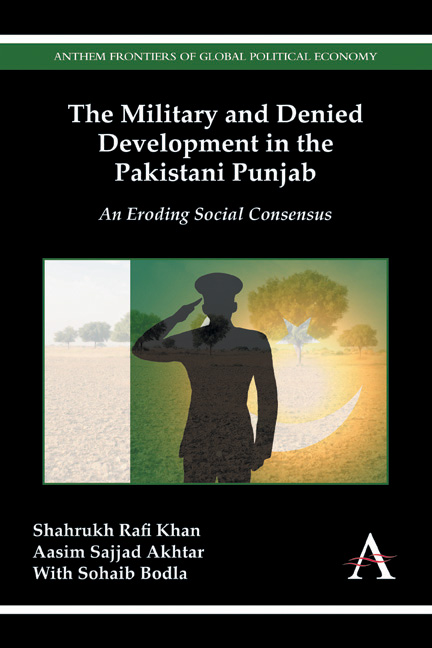Book contents
- Frontmatter
- Dedication
- CONTENTS
- Acknowledgments
- Abbreviations
- Preface
- Chapter One The Military and Economic Development in Pakistan
- Chapter Two Punjab's State–Society Consensus on the Military's Dominance and Economic Role
- Chapter Three Research Design, Method, Institutional Issues and Scope of the Military's Land Acquisitions
- Chapter Four The Military's Agrarian Land Acquisitions: High Handedness and Social Resentment
- Chapter Five From Social Resentment to Social Resistance
- Chapter Six Bahria Town: A Military-Related Real Estate Venture
- Chapter Seven The Military as Landlord in the Pakistani Punjab: Case Study of the Okara Farms
- Chapter Eight Guardians No More? The Breakdown of the Consensus
- Glossary
- Index
Chapter Six - Bahria Town: A Military-Related Real Estate Venture
Published online by Cambridge University Press: 05 December 2014
- Frontmatter
- Dedication
- CONTENTS
- Acknowledgments
- Abbreviations
- Preface
- Chapter One The Military and Economic Development in Pakistan
- Chapter Two Punjab's State–Society Consensus on the Military's Dominance and Economic Role
- Chapter Three Research Design, Method, Institutional Issues and Scope of the Military's Land Acquisitions
- Chapter Four The Military's Agrarian Land Acquisitions: High Handedness and Social Resentment
- Chapter Five From Social Resentment to Social Resistance
- Chapter Six Bahria Town: A Military-Related Real Estate Venture
- Chapter Seven The Military as Landlord in the Pakistani Punjab: Case Study of the Okara Farms
- Chapter Eight Guardians No More? The Breakdown of the Consensus
- Glossary
- Index
Summary
Introduction
In June 2012, a scandal involving Arsalan Iftikhar, the son of the Supreme Court chief justice, and the most high-profile property tycoon in Pakistan, Malik Riaz, exploded onto the public radar screen. Malik Riaz's most well-known real estate initiative is the so-called “Bahria Town” housing scheme in the three major metropolitan centers of Islamabad, Rawalpindi and Lahore. This scandal revolved around alleged payments made by Malik Riaz to Arsalan Iftikhar to influence court hearings related to land acquisitions made for the Bahria Town schemes.
Even before Malik Riaz made an appearance at the Supreme Court, Bahria Town executives were diligently trying to clear his name. In what clearly illustrated the link between the military institution and the burgeoning real estate industry, the two most prominent Bahria Town representatives at the Supreme Court were retired major generals Shaukat Sultan and Ehtesham Zamir, formerly director-general of Inter-Services Public Relations (DG-ISPR) and director of Inter-Services Intelligence (DG-ISI). For any ranking general to be embroiled in such a scandal would have been significant news, but for the former heads of the military's public relations wing and its premier intelligence agency to be advocates of the country's biggest business tycoon proved, yet again, that the military is knee deep in corporate initiatives which have nothing to do with its professional – and constitutional – mandate.
While we support public accountability without qualification, our concern here is neither with this particular scandal nor indeed with establishing the extent to which property tycoons such as Malik Riaz exercise influence over state functionaries at the highest level. Instead, following on from chapter 4, we seek to document in this chapter the land-grabbing practices of an ostensibly private sector real estate franchise with links to the military. Bahria Town (Rawalpindi) is alleged to have come into being through the use of significant coercive force to disenfranchise smallholders in periurban areas that have since been accommodated into metropolitan city limits. Following on from chapter 5, we discuss the incidence of resistance to such coercive land-grabbing and the forms that it takes.
- Type
- Chapter
- Information
- The Military and Denied Development in the Pakistani PunjabAn Eroding Social Consensus, pp. 95 - 104Publisher: Anthem PressPrint publication year: 2014



